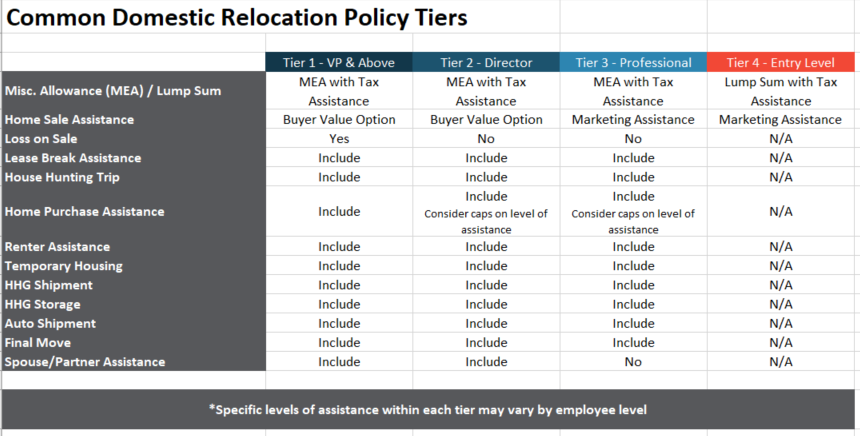A Look at Typical Relocation Packages
Relocation packages, also known as relocation benefits, are policies and support that companies offer employees who are transferring to a location for a position. Each company will have different needs when it comes to relocation benefits, and it can be difficult for companies to know exactly what should be covered in these policies and what the employee should be responsible for on their own. In order to make the chosen candidate a qualified and competitive offer, it’s always a good idea to have a competitive and comprehensive relocation package to offer moving employees.
Companies typically have the ability to tailor relocation programs based on each hiring situation. Some companies choose to have their HR department handle employee transfers, but if the company is looking to be consistent with their relocation packages on each hire, it’s probably a good idea to use a reliable relocation management company.
What Does A Standard Relocation Package Include?
Most relocation policies outline some sort of reimbursement or coverage for many of the common needs of moving. Relocation benefits often include full packing and unpacking services along with a quality and reliable moving company to get the employee’s household goods from point A to point B.
On top of moving expenses, home sale assistance is another common benefit offered to transferees. This can include selling programs using vetted real estate agents who specialize in the relocation process to help assure a quicker and more successful home sale for the moving employee. Some policies may offer lease-breaking assistance for those employees who rent, in the event that the employee has to pay a penalty for breaking a lease early. House-hunting trips can also be included in the real estate portion of the relocation package. This means the company might cover a trip or two for the moving employee to scout out their new area and tour some homes or apartments before making the full move.
Corporate housing options, or temporary housing, are usually included in most relocation policies. This gives the employee a place to stay short-term after they’ve moved in order to find a full-time home in their location, without having to miss their desired start date for the position.
Many companies also offer transportation coverage or reimbursement in their relocation offerings. This might cover airfare for the employee and their family or expenses for driving across state lines. In some instances, companies will cover the employee’s vehicle transportation as well.
What Expenses Are Typically Covered During Relocation?
While not an exhaustive list, the below are common relocations costs for which many companies provide support to their relocating employees:
- Corporate housing options
- Household goods transportation (HHG)
- Storage facility (temporary storage of the HHG shipment
- Miscellaneous expense allowance
- Home sale costs
- Spousal employment assistance
- Travel-related costs, such as airfare, meals, hotel nights
As every company has different goals and objectives for their relocation program it is common to see many relocation policies that are tiered, offering different levels of support for each employee.
Here is a breakdown of the most common U.S. domestic relocation policy tiers per GMS research:


What Types Of Employees Receive Relocation Packages?
This aspect will depend upon the company’s need for each position and how important it is to get that employee to the new location. The best practice for relocation programs is to build a tiered system based on employee level. These tiers are commonly built around entry-level employees, professionals, directors, and vice-presidents. Additionally, many companies have executive relocation packages to cover most executive-range employees. For some companies, they may also have international relocation package examples for employees moving globally.
Common Methods to Address Costs in Relocation Packages
Different policy tiers within your relocation program may necessitate different strategies for paying for your employee’s relocation costs. It is important to understand the advantages and disadvantages of these common methods.
Direct Billing: On your behalf, the relocation company sources, coordinates, and directly pays the vendors used in the relocation of your employee. Invoices are audited, consolidated, and then passed through to you for payment. While potentially more costly, this method ensures that your employee is getting the most out of their benefits and is able to make it to their new destination on time without the need to stress over the costs of the move.
Expense Reimbursement: The employee pays for the cost of moving expenses up front and the company cuts a reimbursement check toward the end of the process. While not generally intended to be used to cover an employee’s entire move (few families have the cash on hand to pay tens of thousands of dollars for a move), reimbursements are commonly used for miscellaneous expenses as outlined in the company’s relocation policy. Typically, reimbursements are used for items such as travel costs, or other related items.
Lump Sum: As opposed to an expense reimbursement, a lump sum is commonly used as the primary financial benefit provided to a relocating employee. In a lump sum policy, a set amount of money is given upfront to the employee so that they can handle the moving expenses as they see fit.
Generally provided to entry level or lower level employees, the lump sum itself is commonly the only relocation benefit provided. While the lump sum is seen as an excellent cost control tool for companies, it places additional burdens on the employee as they are left to their own devices to manage their move. This is in addition to the lump sum typically qualifying as income which is taxable. Employees who receive their relocation benefits in the form of a lump sum should be sure to note the payment for tax purposes. Employers should consider adding a tax gross up to the lump sum to help mitigate the effects of the income tax on the employee’s benefit.
Ready to Set Up Relocation Packages for Employees?
Global Mobility Solutions is a full-service relocation management company who specializes in assisting companies in creating comprehensive relocation packages that benefit both the company and the employee. For more than 30 years, GMS has helped companies get their new employees situated in a new place, assuring the process is seamless for the transferee. If you’re ready to set up or update your relocation policies, reach out to us today.
We're Here to Help! Request a Courtesy Consultation
Are you ready to talk to a Mobility Pro? Learn how GMS can optimize your mobility program, enhance your policies to meet today’s unique challenges, receive an in-depth industry benchmark, or simply ask us a question. Your Mobility Pro will be in touch within 1 business day for a no-pressure, courtesy consultation.
Sam Hoey | CRP, GMS
Senior Vice President, Global Account Management Sam joined Global Mobility Solutions in 1996 and has a unique perspective with her 25 years of industry experience. Samantha offers her clients relocation expertise and a commitment to excellence in her. Her proficiency in orchestrating the BVO and GPO Programs, as well as relocation policy design and implementation, are invaluable assets to the accounts she manages. Her experience in administering Pre-Decision Relocation services to enhance the recruiting process further demonstrates her unique abilities to service her clients. Samantha’s diverse experience, leadership, and outstanding communication skills enable her to manage the relocation process for her clients with finesse and polished professionalism.



